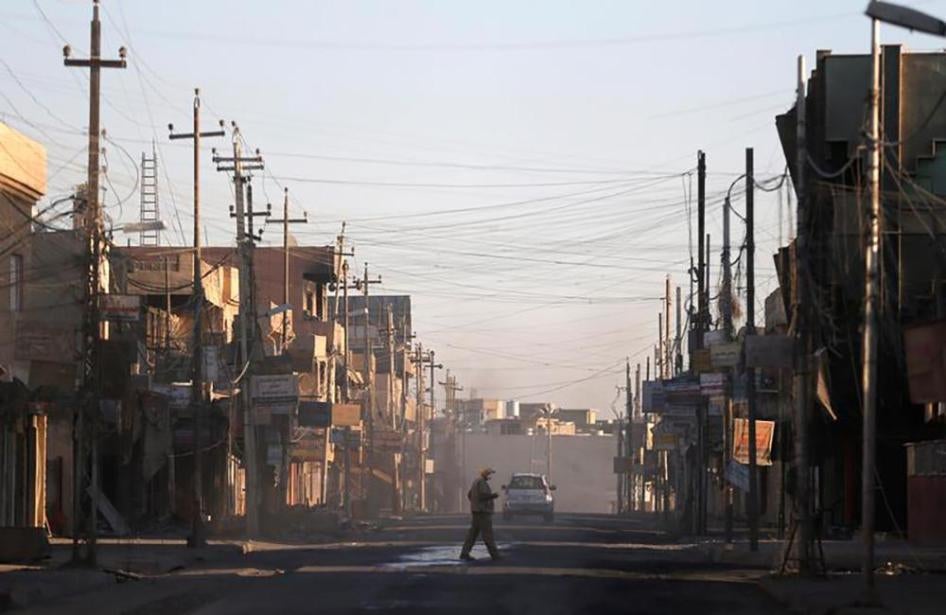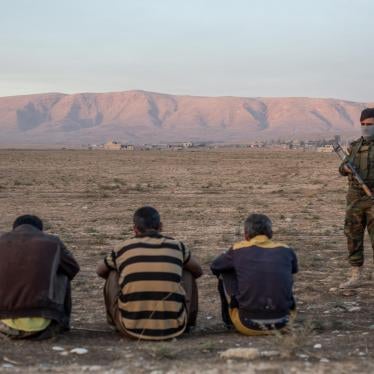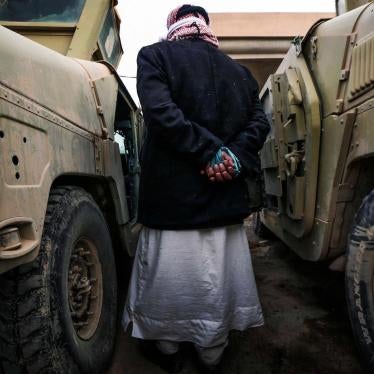(Beirut) – Iraqi authorities have issued arrest warrants for at least 15 private lawyers since July 24, 2017, on charges of Islamic State (also known as ISIS) affiliation for their past work in ISIS courts, Human Rights Watch said today. While lawyers are not immune from prosecution if they engage in criminal activity, they should not be prosecuted for doing their job as lawyers, nor should the authorities associate them with their clients’ cause simply because they represented them.
All were representing ISIS suspects facing trial in Iraqi courts at the time of their arrest, raising concerns among local lawyers that the warrants were issued to intimidate lawyers defending ISIS suspects. One senior judge told Human Rights Watch that since the warrants were issued, private lawyers had stopped taking cases of any defendants that they believed to be ISIS-affiliated, only taking cases of people they thought were innocent. As a result, only state-appointed lawyers are taking on the cases of those believed to be ISIS-affiliated. Based on interviews with four lawyers, there are serious concerns that the state-appointed lawyers are not providing a robust defense of these clients.
“The authorities should immediately explain why they are detaining and charging these lawyers,” said Sarah Leah Whitson, Middle East director at Human Rights Watch. “They need to make it clear that Iraqi lawyers should not be afraid to defend ISIS suspects.”
The 15 lawyers represented suspects before the Nineveh governorate’s counterterrorism court. The court has jurisdiction over cases of people currently held in the governate, which includes the city of Mosul, who are suspected of ISIS affiliation. The court currently operates in the town of al-Hamdaniya, also known as Qaraqosh or Bakhdida. A senior judge told Human Rights Watch researchers when they visited the court in July that the court was working through about 2,000 cases involving people suspected of being ISIS members or affiliated with the group.
On August 5, the senior judge told Human Rights Watch that his court had gathered evidence, including witness testimony, that 15 defense lawyers representing ISIS-affiliated suspects at the court had worked as lawyers in ISIS courts in Mosul. The judge did not know what role the lawyers are alleged to have played within the ISIS courts, and Human Rights Watch has not been able to review the accusations. Iraq’s counterterrorism law (no. 13/2005) punishes with death anyone who has committed, incited, planned, financed, or assisted a terror act and stipulates a life sentence for anyone who covers up such an act or harbors those who participated.
Mazen al-Saraf, a member of the Mosul Branch of the Iraqi Bar Association, said that he was sent the list of those accused before the arrests took place, and he said on August 7 that six had so far been detained, with four already in the court’s custody. The president of the Iraqi Bar Association, Ahlam Lamy, visited the court on August 6 to inquire about the arrests and ensure that the lawyers have legal representation.
One person with close knowledge of the court’s processes said he felt that this action was taken to intimidate lawyers currently defending ISIS suspects and to create a chilling effect, rather than based on specific evidence of ISIS affiliation. While Human Rights Watch cannot independently confirm the motivation for the charges, the senior judge did confirm that the accusations left other defense lawyers afraid to take the cases of any suspect they believed was actually ISIS-affiliated. Given that the Iraqi constitution and Criminal Procedure Code (no.23/1971) guarantee all detainees the right to a lawyer during interrogations and hearings, the government has appointed a lawyer for these ISIS suspects.
Human Rights Watch researchers observed two trials in which defendants had a state-appointed lawyer. The lawyers did not speak once during the hearings, with the judge and the court stenographer directly questioning the defendant.
Authorities should make public the basis for the prosecution of these 15 lawyers and ensure that no lawyers are prosecuted contrary to the United Nations standards on the role of lawyers. They should ensure that the rights of the 15 lawyers, and other detainees held on ISIS-affiliation charges to choose their legal representation are fully met.
International law guarantees anyone accused of a crime access to a lawyer at all stages of criminal proceedings, including during the investigation, the pretrial proceedings, and during the trial itself. Under article 1 of the UN Basic Principles on the Role of Lawyers, “All persons are entitled to call upon the assistance of a lawyer of their choice to protect and establish their rights and to defend them in all stages of criminal proceedings.” Article 14 of the International Covenant on Civil and Political Rights, ratified by Iraq, says everyone charged with a criminal offense has the right to defend themselves through legal assistance of their own choosing, as well as to have adequate time and facilities for the preparation of their defense and to communicate with counsel of their own choosing.
The principles also state that anyone arrested or charged with a criminal offense, shall, in all cases in which the interests of justice so require, be entitled to have a lawyer of experience and competence commensurate with the nature of the offense assigned to them to provide effective legal assistance, without payment by them if they lack sufficient means to pay for such services.
The principles state that: “Governments shall ensure that lawyers … are able to perform all of their professional functions without intimidation, hindrance, harassment or improper interference,” and “shall not suffer, or be threatened with, prosecution or administrative, economic or other sanctions for any action taken in accordance with recognized professional duties, standards and ethics.”
They also state that lawyers shall not be identified with their clients or their clients’ causes as a result of discharging their functions, and that lawyers shall enjoy civil and penal immunity for statements made in good faith in pleadings or in their professional appearances before a court. However, under international criminal law, lawyers and judges can be prosecuted in exceptional cases when they have directly contributed to war crimes or crimes against humanity, including the war crime of executions following unfair trials.
“Iraqi authorities should ensure that the 15 lawyers facing arrest warrants are entitled to due process protections and fair trials that ISIS denied to all of its victims,” Whitson said. “The authorities should make every effort to explain to the public whom they are prosecuting and why.”
|
News Release
Iraq: Lawyers Arrested for Work in ISIS Courts
Chilling Effect on Private Legal Representation
Your tax deductible gift can help stop human rights violations and save lives around the world.
Region / Country
Tags
Most Viewed
-
November 25, 2019
A Dirty Investment

-
June 3, 2025
“They’re Ruining People’s Lives”

-
December 21, 2023
Meta’s Broken Promises

-
January 25, 2024
“We’re Dying Here”

-
November 12, 2018
“Shall I Feed My Daughter, or Educate Her?”




